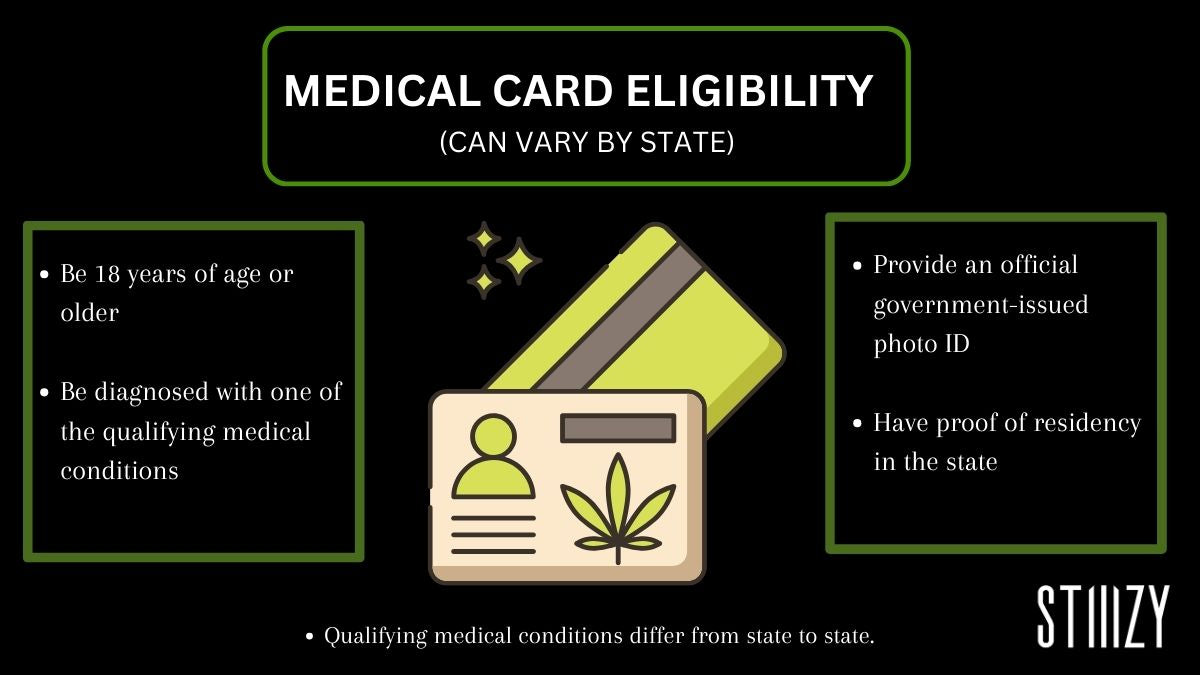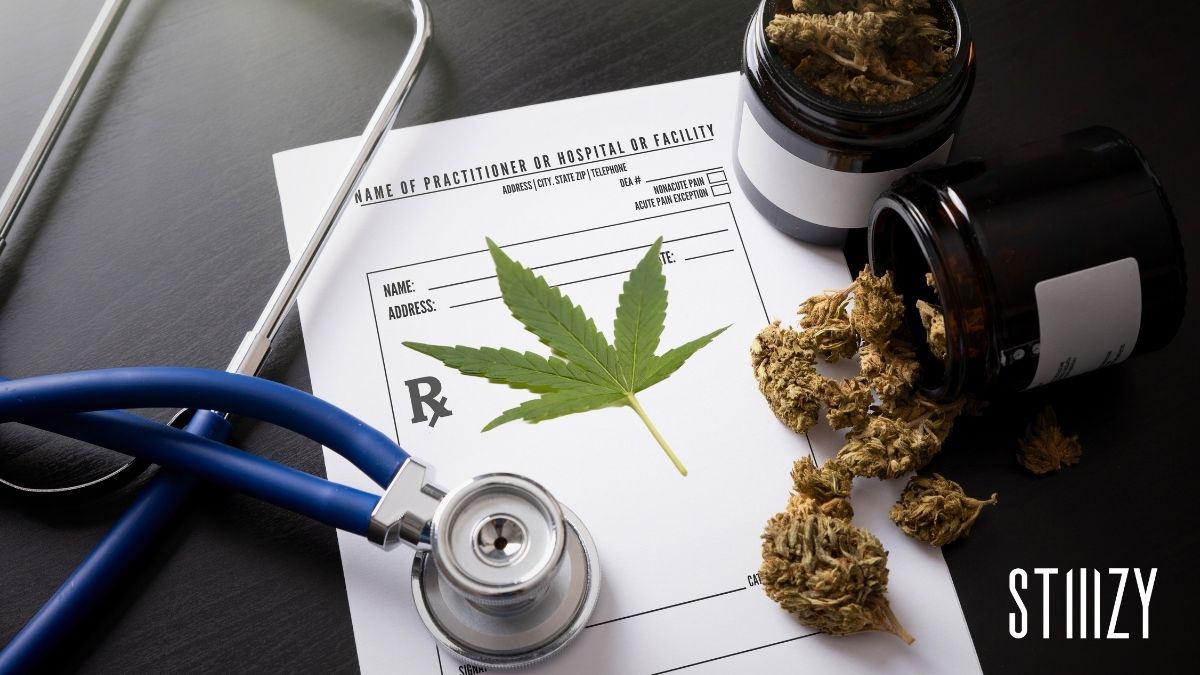How To Get A Medical Marijuana Card
Alright, here's the deal: Medical cards for cannabis can offer some unique advantages. They can help you save some cash, give you access to a broader range of products, and sidestep some of the stigma tied to recreational use. But, no stress! They're not a must-have. You do you and find what works best for your needs. A medical card could be a solid move if you want a few extra benefits.
To illustrate the diversity in regulations for medical marijuana, we're examining the specific criteria and procedures in both California and Michigan. These instances demonstrate that each state has distinct guidelines and processes. For information pertaining to other states, individuals are encouraged to research the respective local laws and regulations.
Medical Card Eligibility

The list of qualifying medical conditions varies from state to state but generally includes serious or chronic illnesses.
For California qualifying conditions:
-
Acquired immune deficiency syndrome (AIDS)
-
Anorexia
-
Arthritis
-
Cachexia (wasting syndrome)
-
Cancer
-
Chronic pain
-
Glaucoma
-
Migraine
-
Severe nausea
-
Persistent muscle spasms (for example, spasms caused by multiple sclerosis)
-
Seizures (for example, epileptic seizures)
Your doctor may also suggest cannabis as a remedy for chronic or ongoing, debilitating medical conditions or symptoms that:
-
Significantly hinder your ability to perform important daily activities
-
Could pose a serious threat to your safety, physical well-being, or mental health
Additional conditions may be added over time.
For Michigan qualifying conditions:
-
Cancer
-
Glaucoma
-
HIV Positive
-
AIDS
-
Hepatitis C
-
Amyotrophic Lateral Sclerosis
-
Crohn’s Disease
-
Agitation of Alzheimer’s Disease
-
Nail Patella
-
Post - Traumatic Stress Disorder
-
Obsessive Compulsive Disorder
-
Arthritis
-
Rheumatoid Arthritis
-
Spinal Cord Injury
-
Colitis
-
Inflammatory Bowel Disease
-
Ulcerative Colitis
-
Parkinson’s Disease
-
Tourette’s Disease
-
Autism
-
Chronic Pain
-
Cerebral Palsy
A chronic or debilitating disease or medical condition or its treatment that produces one or more of the following:
-
Cachexia or Wasting Syndrome
-
Severe and Chronic Pain
-
Severe Nausea
-
Seizures (Including but not limited to those characteristic of epilepsy)
-
Severe and Persistent Muscle Spasms (Including but not limited to those characteristic of multiple sclerosis)

Benefits of a Medical Card
While recreational cannabis users can often access the same products and dispensaries as medical users, there are a few distinct benefits to having a medical card.
-
Increased possession limits
Medical cannabis patients can usually possess more cannabis than recreational users. -
Access to a broader range of products
Medical dispensaries may offer more specialized cannabis products. -
Higher potency limits
Medical cannabis products may have higher THC limits than their recreational counterparts. -
Access to medical-only dispensaries
Certain dispensaries cater specifically to medical cannabis patients, often offering a wider variety of products. -
Legal protection
While cannabis use is generally accepted in these states, having a medical card can offer extra legal protection in certain scenarios.
How to Get a Medical Cannabis Card in California
In California, the use of both medical and recreational marijuana has been legalized. This progression in legislation has opened up the market, allowing individuals above the legal age to purchase and consume cannabis without requiring a medical card. However, recreational legality does not invalidate any medical conditions or the potential benefits of acquiring a medical marijuana card.
-
Doctor's Recommendation: Obtain a recommendation for medical cannabis from a doctor licensed in California.
-
Application: Complete an application with the Medical Marijuana Identification Card Program (MMICP) in your county.
-
Make an appointment with your county health department: To complete your application, it’s necessary to submit it in person. Reach out to your county health department to schedule an appointment.
-
Go to your appointment: To obtain your ID card, you must pay an application fee and have your photo taken. The application fees differ across counties, but they are at most $100. If you apply as a primary caregiver, the patient must accompany you to the appointment. If you receive healthcare through Medi-Cal, your application fee is discounted by 50%. Your application fee is waived if you receive healthcare through a medically-indigent service program.
-
Wait for approval: The county health department may take up to 35 days to issue your medical marijuana ID card.
If your county public health or department denies your application, you can file an appeal with the California Department of Public Health. There is no fee for this.
How to Get a Michigan Medical Marijuana Card
The Cannabis Regulatory Agency (CRA) can help you register and obtain medical marijuana identification cards in Michigan. If you're a medical marijuana patient, you can easily apply for the Michigan Medical Marijuana Program (MMMP) identification cards online or by mail. Keep in mind that if you're looking to designate caregivers, the application and registration process cannot be done online.
-
Doctor's Certification: Obtain a certification from a physician stating that you have a qualifying medical condition for medical cannabis.
-
Application: To apply for the MMMP ID card by mail, patients must fill out and send the MMMP Application Packet. The submitted packet should contain the completed application form, physician certification, proof of Michigan residency, and application fee. If a patient designates a caregiver, the packet must include a copy of the caregiver's valid state-issued driver's license or personal identification card.
-
Online application: Go to http://www.michigan.gov/mmp and follow the given instructions.
-
Paying Fees: The Michigan medical marijuana identification card costs $40 for online and mail applications. Payment methods include electronic checks, debit cards, and credit cards (Visa, MasterCard, and Discover). Caregivers do not have to pay additional fees, and there are no reduced fees for patients on financial aid. Renewing a medical marijuana card in Michigan also costs $40.
-
Approval: An approval email will be sent to the patient upon application approval. The MMMP ID card will be mailed to the applicant within 15 business days after approval.
Potential Risks and Drawbacks
While having a medical card has benefits, there are some potential downsides to consider:
-
Privacy Concerns: Patient information may be stored in state databases.
-
Costs: The initial and ongoing costs associated with maintaining a medical card.
-
Renewal Requirements: Regular renewals may be necessary, often annually or biannually, depending on the state.
-
Limited Reciprocity: Not all states recognize out-of-state medical marijuana cards.
-
Age Restrictions: While most states recognize medical marijuana use in minors, this is not universal.
-
Insurance Coverage: Medical insurance may not cover the costs of medical cannabis products.
-
Complex Laws: States have different regulations and protocols related to obtaining or renewing a card, and they can be challenging to navigate.
If you're considering medical cards, research your state's laws first. Knowing the pros and cons of getting a medical card helps you make an informed decision about your health!
FAQs
In both California and Michigan, you can consult with any state-licensed physician or osteopath to recommend medical marijuana. You may ask your primary care doctor if they are comfortable recommending medical cannabis after you provide information needed. If they are not, there are many specialized clinics and online platforms where certified doctors specifically provide this service, such as:
mycompassionateclinic.com/medical-cannabis-patient-consults/
Ensure that the doctor you consult is licensed in your respective state.
This depends on whether the state you visit has approved a reciprocity policy. Reciprocity policies allow for out-of-state medical cannabis patients to access medical cannabis.
- California — California doesn't do reciprocity laws, so they don't accept out-of-state medical cannabis cards. If you're visiting California, you can get a medical marijuana ID card without a California address.
- Michigan — Out-of-state medical sales are up to the dispensaries.
- In California, you typically need to renew your medical cannabis card annually. The process involves obtaining a new physician recommendation and completing a renewal application.
- In Michigan, medical cannabis cards are valid for two years. You must consult a physician and fill out the MMMP renewal application to renew your card.
Possessing a medical cannabis card could potentially affect employment and other legal matters, especially since cannabis is still illegal at the federal level. Some employers may have policies against cannabis use, even for medical reasons. Understanding your employer's policy before getting a medical card is always best.
As for insurance, it's important to note that insurance companies typically do not cover the cost of medical cannabis, as it's still classified as a Schedule I drug by the federal government.
For legal matters, having a medical card could affect things like custody battles or other legal proceedings. It's always best to consult with a legal expert if you're concerned about how if you were to get a medical card or cannabis card might affect these matters.
Please note that laws and policies can change, so it's always important to check the most recent legislation or consult a legal expert in your state!
STIIIZY complies with all applicable state laws regarding the sale and marketing of cannabis products. This content is intended for adults 21+ in jurisdictions where cannabis use is legal under state law. By engaging with this material, you acknowledge that you are of legal age in your jurisdiction.
This content is for informational and educational purposes only. It is not intended to diagnose, treat, cure, or prevent any disease or medical condition. STIIIZY makes no health claims about cannabis products. Consult a licensed healthcare professional before using cannabis, especially if you are pregnant, nursing, or have a medical condition.
Cannabis products may affect individuals differently. Consume responsibly and avoid operating vehicles or machinery after use. STIIIZY disclaims all liability for any adverse effects, legal consequences, or misuse resulting from the use of our products or reliance on this content.
Cannabis laws vary by state and locality. This content does not constitute legal advice. Users are responsible for understanding and complying with their local regulations.
Statements about product effects or benefits are based on general industry knowledge and user experiences. Individual results may vary. STIIIZY does not guarantee specific outcomes.
References to third-party studies, testimonials, or external resources are provided for context only. STIIIZY does not endorse or validate these materials unless explicitly stated.
The views and opinions expressed in this blog are those of the author and do not necessarily reflect the official policy or position of STIIIZY.


